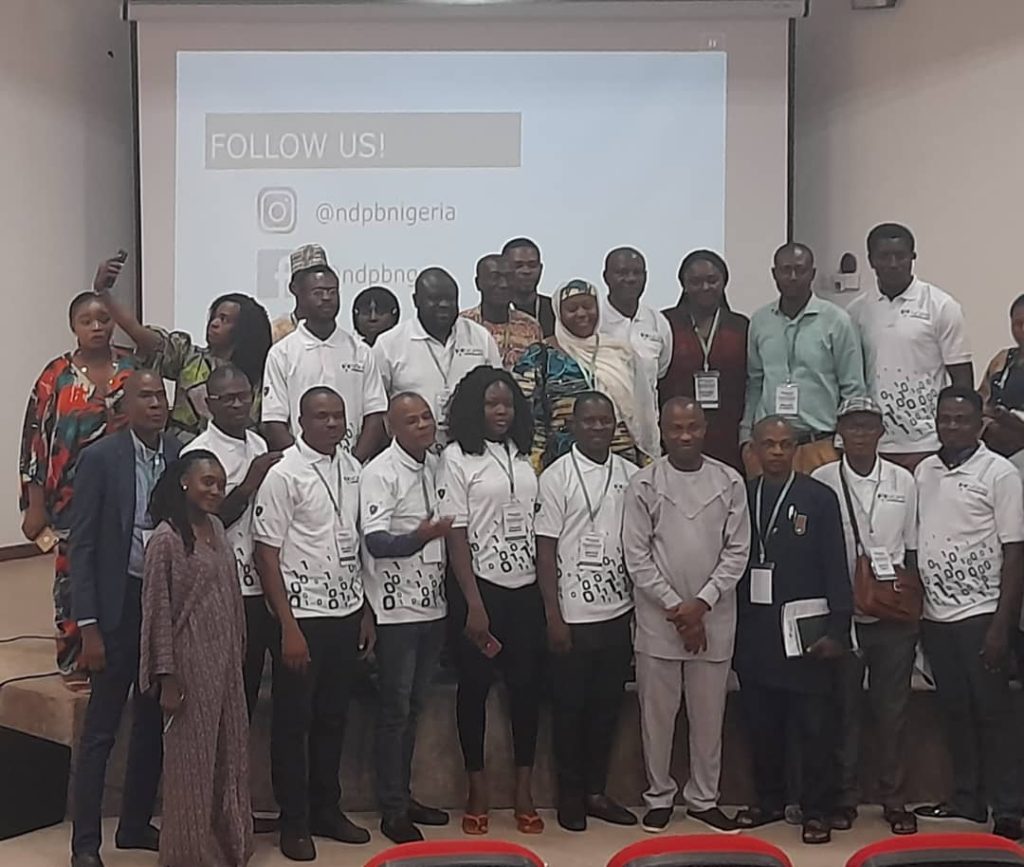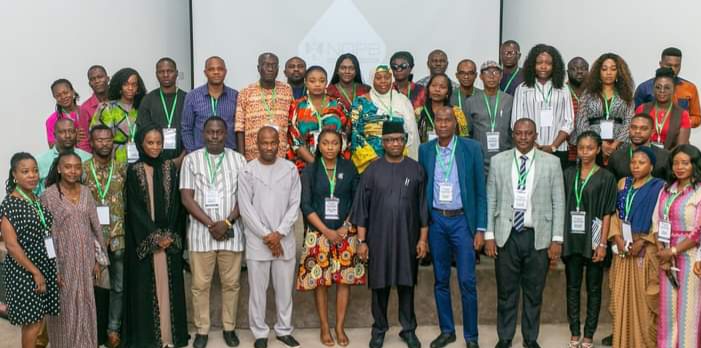..Urges journalists to build capacity on data protection and privacy
By Chimezie Godfrey
The National Commissioner, Nigerian Data Protection Bureau (NDPB), Dr. Vincent Olatuji has revealed that about 490,000 available jobs on data protection and privacy are waiting for Nigerians.
Olatunji made this startling revelation over the weekend in Abuja during a workshop organized by the bureau aimed at creating awareness and building capacity of members of the Nigeria Information Technology Reporters’ Association (NITRA) on data protection and privacy.

The NDPB Boss who noted that the digital economy sector was a completely new sector that would create jobs and create wealth for the country, pointed out that journalists could build capacity on data protection and privacy, and train to become Data Protection Officers (DPOs), as an additinal means of earning income.
He therefore urged media practitioners. as well as other Nigerians to get the necessary skills that would empower them to take advantage of the inherent opportunities in the sector.

He said,”In Nigeria, the last survey that we did, we discovered that we have over 500,000 data controllers and data processors in the world and this says that each data processor, must have a Data Protection Officer (DPO). These are certified people who have deep knowledge about data protection and privacy to assist their organisations, to advice them on data protection to ensure that any data they collect, process, store, and share that the process will be within the available law in the country, that is, to ensure that they don’t break the law and also, to ensure that they put in place appropriate measures to ensure that the data with them is adequately protected.
“In Nigeria as of today, those of us who are certified as data protection officers, we are not up to 3000. You can see the gap. Where we have over 500,000 data processors and controllers and each of them is supposed to have a DPO. Whereas, the number of certified DPOs in Nigeria are not up to 10,000. So we have a gap of about 490,000, jobs waiting for people. But is this information available to people? Do people really have the skills to take up these jobs? And one good thing about this is the fact that globally it is the same thing. If you are certified and you know what you are doing you can work anywhere. You can even be in Nigeria and be a DPO for a company outside the country.
“So this is a completely new sector that will create jobs, that will create worth for the country. Part of the target of the digital economy sector is to create two million jobs in 24 months. You can now imagine if the data privacy system alone already has about 490,000 jobs waiting. You can imagine what that can do.
“You can imagine all the banks, all the insurance companies, all the hotels, all the schools, aviation, all sectors, employing DPOs. Imagine what that will do for the country. So it’s a sector that is loaded with potentials to create jobs and to create wealth for Nigerians. But if we are giving out this information and they are not reported accurately, we will definitely miss out on knowing that fact of what is really happening and that is why this training is important for you people. You need to thoroughly understand the eco-system and know what we tend to achieve.”
Olatunji disclosed that the bureau was making efforts to put in place a certification mechanism with the aim to build the capacity of about 50,000 Nigerians every year.
He projected that in the next 5 years, the bureau intends to build the capacity of 250,000 Nigerians.
“On our on part, as a bureau, we are trying to put in place a certification mechanism and our target is to ensure that we build the capacity of about 50,000 Nigerians every year. So in the next 5 years, on our own, we are looking at building that capacity of 250,000 Nigerians.
“And the good thing is that it doesn’t have any age limit. Some of my colleagues that retired from NITDA as Directors they are now registered DPCOs data protection compliance organizations and what do they do? Because that is the model we adopted in Nigeria which is very unique to us and some other countries are even discussing with us now to copy this model.
“We were in Kenya about two weeks ago, the Data Protection Commissioner in Kenya told us theirs about three years ago, but in terms of compliance, in terms of monitoring they have not really gotten the aspect. But When we started we adopted this model of PPP by licensing DPCOs who offer compliance as a service to organizations and we have been able to increase the level of public-private compliance. Because the law says that data processors must file their annual reports to us for us to be able to measure the level of compliance. So it is now compulsory for all the data processors to file their audit reports with us,” he said.
He added,”It is the public sector which has been our major challenge.As part of our awareness campaigns and partnerships, we visited the office of the former Secretary to the government of the federation and we were able to develop a secular which the SGF issued to all MDAs to comply with the provisions of the law as stated in the NDPR that all MDAs too must obtain their DPOs, train, and creat awareness.
“So in the public sector, when we started , the level of awareness was just four percent but within two months of issuing that secular, it increased to 9 percent by the time we are doing our next audit I am sure it would have increased.
“These are all these things that we are trying to put in place and we can’t do it alone. Infact, through the model that we have put in place, we have been able to crate 9000 jobs within two years. So this is a sector that will create jobs and even make people employers of labour.”
The NDPB Nat’l Commissioner stressed that the job of the bureau was important in implementing the Data Protection and Privacy Regulation in the country.
He revealed that the bureau when it becomes a commission would be self funding, adding that it would not rely on government money.
“Our population in Nigeria is almost half of that of EU and their regulation is so strong. I don’t know if you are aware that recently, just about three weeks ago, they fined Meta 1.3 million Euros. You know what that does to our economy. You can imagine if we can on our own part be able to catch one defaulter and fine them millions of dollars. You know what that means.
“So the job of the bureau is very important in implementing the Data Protection and Privacy Regulation in the country.
“And one good thing is that if the Bureau eventually becomes a commission, it will become self funding. Then we won’t rely on government money because data controllers, data processors pay a token whenever they are filing their audit reports with us and those that will be licenced too will pay licence fee and if there is any major fine, they pay it. So the benefit is that the bureau will be able to fund itself effectively and even make money for government. So you can see some of the advantages.
“And I challenge you too, don’t rely on what you are doing alone. An average human being should have multiple sources of income to sustain ourselves. Who says you can’t become a DPO? You can key into it. No educational background required. If you study History, Arabic Studies, be it Bible Studies, you can become a DPO. As long as you can read and write. You understand what it is about. It is not a big deal.”
Olatunji further said,”Between 2019 and early 2022. Global trend now is that it is actually important for you to have an independent data protection regulatory authority that will completely oversee the issue of data protection in the country. That was why the Nigeria Data Protection Bureau was set up in February 2022. Between when we started and now, we have done massive awareness creation, capacity building for us to fully entrenche the idea of data protection in our system, bearing in mind, the operating level of organizations in Nigeria and in all sectors.
“And looking at the way we disseminate information, we have seen all of you here, as our major stakeholders and we decided that we should come together as a body and share our knowledge about data protection to you and for you to see the inherent potential of this sector.”




